Ranking All 40 of Steven Moffat’s Doctor Who Stories – Part 2: #30 - #21
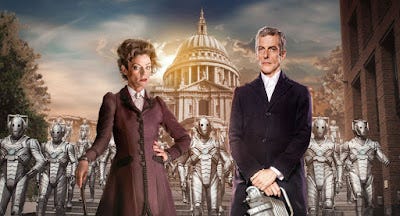
On April 3rd, 2010, a new era of Doctor Who began with “The Eleventh Hour,” and this week, that era came to an end with “Twice Upon a Time,” the Christmas Special that saw Steven Moffat, Peter Capaldi, and a whole host of other creatives from the era take a bow, handing the reigns off to Chris Chibnall and Jodie Whittaker for the show’s next, exciting step forward.
But with any change comes a chance for reflection, which is what I am doing here. Now that his final episode is out in the world, I am counting down all 40 – count ‘em, forty – Doctor Who stories Steven Moffat has contributed, as writer or, in a few rare cases, co-writer, from 2005’s “The Empty Child” to this week’s “Twice Upon a Time.” I watched every single one of these again, took extensive notes, and ranked them from least-favorite to most-favorite.
This series is also a walk down memory lane, as I have included links to my original written reviews and/or the original Weekly Stuff Podcast reviews to every episode (save some of Moffat’s earliest Russell T Davies-era stories, for which the podcast and my site did not yet exist). In some of these original reviews, you will see that my thoughts are either markedly more positive or negative than they are now, which is part of the fun of this project – I’ve been living with, writing about, talking about, and reconsidering these episodes for years now, some for nearly a decade, and trying to put a punctuation note on that progression (for now) is part of what attracted me to this project.
This list will be published in four parts, once a day through the end of the week, with each part containing 10 episodes. I hope you enjoy, and if you would like to listen to these rankings in Podcast form, we did a whole episode for that.
Be sure to catch up with Part 1 if you haven’t already, and without further ado, let us continue with Part 2 - #30 - #21, coming up after the jump…
30. The Return of Doctor Mysterio
Twelfth Doctor, 2016 Christmas Special; Directed by Ed Bazalgette
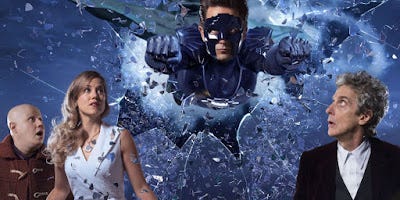
“Things end. That’s all. Everything ends, and it’s always sad. But everything begins again too, and that’s always happy. Be happy. I’ll look after everything else.”
For an episode that contains one of Peter Capaldi’s finest dramatic moments as the Doctor (the scene near the end quoted above), “The Return of Doctor Mysterio” is on the whole notable for just how goddamn funny it is, a chance for Moffat, Capaldi, Matt Lucas (making his ‘proper’ debut as Nardole), and guest stars Justin Chatwin and Charity Wakefield to cut loose and simply have an absurd amount of fun. The plot structure is thin, and there’s very little thematic substance to speak of, but the screwball comedy tone the episode aims for is nailed by all involved. Special mention must go to director Ed Bazalgette, who nails the timing of many outstanding visual gags, such as a quiet pan back from Lucy, snooping at the Harmony Shoals building, to reveal the Doctor leaning against a wall, casually eating sushi (“Yeah, I’m an intruder too,” Capaldi deadpans). Beat after beat, “Mysterio” is pretty relentlessly funny and entertaining, and as a welcome back to viewers after a full year off (and something of a palette cleanser before the thematic heaviness of Series 10), it made for a wonderful Christmas present.
29. The Pyramid at the End of the World
(written with Peter Harness)
Twelfth Doctor, Series 10; Directed by Daniel Nettheim
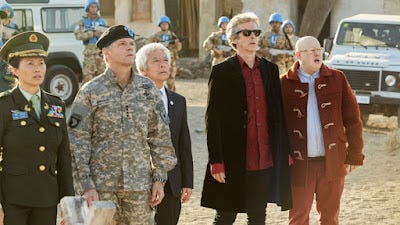
“Hello, I’m the Doctor, saving the world with my eyes shut!”
If “The Pyramid at the End of the World” isn’t as astonishing as “Extremis,” its immediate predecessor and the first third of Series 10’s ‘Monk Trilogy,’ it is still an absolutely worthy follow-up, taking the established threat of the Monks – an enemy who has modeled the whole of human history to find a weak point – and finding a smart, interesting premise on which to pay it off. The episode’s hook – that the Monks are invading at a moment of potentially world-ending crisis, but no one knows what that crisis might be – is a really good one, and the parallel story wherein a series of mundane accidents at a lab will lead to that crisis, only adds to the tension. It’s a very good, well-paced invasion yarn, the only serious weak point being the 3 military leader characters, none of whom feel organic or interesting enough to carry their part of the story; had this been a more traditional UNIT story, with more established characters like Kate Stewart filling those roles, parts of the episode would almost certainly work better.
But that’s relatively easy to overlook given the general quality of the writing, and especially the complicating factor of the Doctor’s blindness, which this hour, like others in Series 10, makes very good use of. The climax, in which Bill trades away control of the Earth to give the Doctor his sight back, is simply a tremendous sequence, not only beautifully played by both Pearl Mackie and Peter Capaldi, but written with effective complexity and nuance. We are at once completely aware that Bill is doing something foolish in giving in to the Monks, but also completely understand and forgive her for it, such is the bond she and the Doctor have forged, and such are the mistakes the Doctor has made in hiding his vulnerability.
28. Let’s Kill Hitler
Eleventh Doctor, Series 6; Directed by Richard Senior
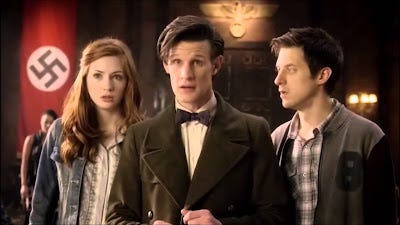
“As first dates go, I’d say that’s mixed signals.”
“Let’s Kill Hitler” is a very fun episode of Doctor Who that I think I like more in isolation than I do as part of the larger Series 6 story arc. In that context, it has a lot of very wonky elements, completely waving away the trauma of Amy and Rory losing the chance to raise their child and doing an altogether frustrating job following up on the cliffhanger and emotional fallout of “A Good Man Goes to War.” But viewed as its own bombastic time travel adventure, and especially as an origin story for Alex Kingston’s River Song, “Let’s Kill Hitler” soars, mixing some wild, utter absurdity – “Rory, take Hitler and put him in that cupboard over there” – with some very good emotional material between River and the Doctor. The episode’s second half, with a dying Doctor struggling against all odds to show River the better side of herself he’s seen so many times before, provides some of the best material Matt Smith or Alex Kingston would ever play in the series. I find the beginning and the end of the Series 6 story arc mostly frustrating these days, but the middle episodes – this one and “Good Man” – are really quite outstanding, proving that sometimes the journey is worth more than the destination.
27. Deep Breath
Twelfth Doctor, Series 8; Directed by Ben Wheatley
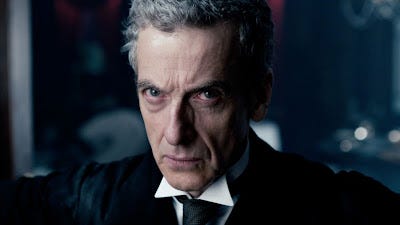
“Who frowned me this face?”
At a full 78 minutes, “Deep Breath” just inches past “The Day of the Doctor” for the title of ‘longest single Doctor Who episode,’ and the unnecessarily padded runtime is far and away the story’s biggest flaw. “Deep Breath” has a lot of very interesting ideas on its mind, and in introducing Peter Capaldi’s Twelfth Doctor it makes a hard, conscious shift in tone, theme, and character that plays a lot better with four years of new stories and hindsight than it did in 2014. The writing is frequently beautiful here, scenes like the one quoted above or some of the closing moments between the Doctor and Clara positively aching with emotion. The story has a really interesting thematic core about the gap between physical appearance and inward identity, one that perfectly sets the stage for the Twelfth Doctor’s subsequent existential musings, and some of the metatextual elements – like the Doctor telling Clara he’s not her boyfriend – play compellingly as in-universe admissions of traps modern Who had too often fallen into.
But for all its positive qualities – and I see more every time I revisit it – “Deep Breath” is simply much too long for its own good, nearly every scene elongated to (or past) its breaking point, with many of the best moments and ideas buried under too many layers of unnecessary fluff. Give this one a proper editor (at both the scripting and post-production stages, frankly), get it under an hour, and cut out unnecessary material with the ‘Paternoster gang’ or Matt Smith’s cameo, and “Deep Breath” might well be one of the better Doctor introduction stories. As it stands, it’s a good and memorable one, compromised by its own length, but which still marks the transition into a creatively fertile period far more effectively than any of us realized at the time.
26. Dark Water / Death in Heaven
Twelfth Doctor, Series 8; Directed by Rachel Talalay
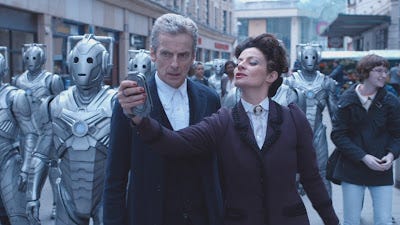
“Do you think I care for you so little that betraying me would make a difference?”
While the second hour of this Series 8 finale is a rather up-and-down affair (the biggest problem being a tone that is all over the map, the underlying darkness of Moffat’s script not always sitting comfortably with the energy of Michelle Gomez’s wonderful performance as Missy), the first hour is terrific in all sorts of ways, and there are pockets of truly extraordinary writing throughout, consistently portending the all-around greatness that would click into place in Series 9. The story shines brightest in how it pushes the relationship between Clara and the Doctor, charted so beautifully throughout the season, to such compelling extremes. The opening scenes of “Dark Water,” in which Clara’s grief leads her to nearly betray the Doctor irrevocably, are wildly powerful, and the closing scene of “Death in Heaven,” where both characters lie to one another rather than admit their inner pain to the friend sitting across from them, is one of the finest and most poignant grace notes on which a Doctor Who season has ever ended. I was harder on this one when it first aired, but in hindsight, these two episodes are far more of a piece with the highs of Series 9 and 10 than I realized at the time, and as the Who debut of director Rachel Talalay, who would go on to do all of Capaldi’s finales and is perhaps the finest director to work on the modern show, these episodes are also aesthetically rousing to an astonishing degree.
25. Silence in the Library /
Forest of the Damned
Tenth Doctor, Series 4; Directed by Euros Lyn
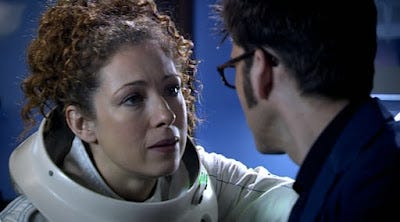
“Got a problem with archeologists?”
“I’m a time traveler. I point and laugh at archeologists.”
The most uneven of Moffat’s RTD-era scripts, this two-parter is best remembered as the debut of Alex Kingston’s River Song, and rightfully so. This remains one of the best uses of the character, as the mystery of her relationship with the Doctor adds an extra layer of intrigue to the proceedings and gives the story an extremely effective emotional climax to build towards. And Kingston is so good opposite Tennant’s Doctor that I wish we had more stories between the two of them, even as this is one of the few points in Doctor Who history where it feels like the continuity wouldn’t allow for it.
The story itself is a bit hit-or-miss for me. The hits are, to be fair, pretty substantial: the Vashta Narada are great villains (and Tennant relishes saying their name every time), the idea of the ‘consciousness echo’ in the space suits is one of Moffat’s most existentially terrifying ideas, and the entire first hour is a masterclass in imagination, tension, and pacing. But the second hour doubles down on a weird, mostly unnecessary thread about the computer simulation that has uploaded the minds of the library’s inhabitants, and once companion Donna is absorbed into it, we’re treated to a lot of long, tedious scenes waiting for Donna to realize her new reality is in fact false, something that was never in doubt to the audience. It drags the story down a lot for me, essentially sidelining the Vashta Narada and the library action for a series of scenes that would be much better served as their own Doctor Who story. Still, this is something of a classic for a reason, and if all it had to offer was the birth of River Song, that would still make it a noteworthy story. That it has a lot more on its mind, warts and all, undeniably makes it one of Moffat’s most fascinating creations.
24. The Caretaker
(written with Gareth Roberts)
Twelfth Doctor, Series 8; Directed by Paul Murphy
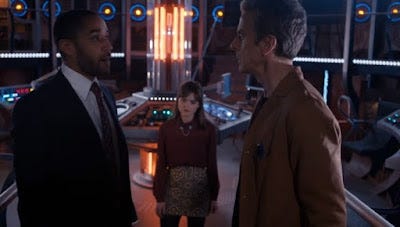
“Why do you do it? Why do you fly off in the box with him? The truth. Please, just this once.”
“Because…it’s amazing. Because…I see wonders.”
A spiritual sequel of sorts to Gareth Roberts’ “The Lodger” and “Closing Time,” two stories that helped define the Eleventh Doctor by placing him in a mundane human setting, “The Caretaker” is every bit as riotously funny as those earlier entries – and every bit as perceptive in contrasting the specific characteristics of the Twelfth Doctor with the mundanity of his undercover surroundings – while ultimately going for something a bit darker and deeper. Like much of Series 8, this story belongs more to Clara than it does the Doctor, as it is the clashing of her ‘real’ and ‘secret’ lives – embodied by Danny Pink and the Doctor, respectively – that serve as the hour’s dramatic underpinning. The sequence where Danny discovers the Doctor and Clara in the middle of an insane adventure is a very good and funny one – Clara’s “It’s a play!” excuse is one of Jenna Coleman’s funniest moments – before deftly transforming itself into a more serious, intimate character play, with Danny’s indignation, the Doctor’s jealousy, and Clara’s divided sense of loyalty driving the rest of the action. Peter Capaldi is in outstanding form here, and this might be the season’s best use of Samuel Anderson’s Danny Pink, but it’s Jenna Coleman who truly steals the show. The wounded look on her face in the TARDIS after the Doctor and Danny have their blow up is a painful, beautiful piece of acting, and the way she delivers the line quoted above, simply yet passionately describing the joy of travelling with the Doctor, makes for one of Clara’s most defining moments.
23. The Snowmen
Eleventh Doctor, 2012 Christmas Special; Directed by Saul Metzstein
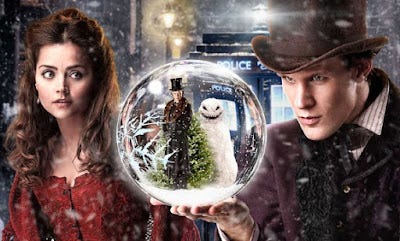
“I never know why. I only know who.”
Settled in the middle of the two awkward halves of Series 7 was “The Snowmen,” a rather wonderful Christmas special that has only gotten better with age. Some of the arc-related wonkiness still annoys – the Doctor sees Clara more as a mystery than a person, hints of a (thankfully aborted) Doctor/Clara romance are gross, and Moffat’s barrage of “Doctor WHO?” puns are here in full force – but when I watch it today, it’s a lot easier to focus on the plentiful amount of great material on display. The wintry Victorian atmosphere is a great setting, the ‘Paternoster’ gang (Madame Vastra, Jenny, and Strax) feel refreshing and valuable, Moffat’s comedy writing is frequently top notch, and getting both Richard Grant and Ian McKellan as antagonists is a pretty great two-for-one deal. Jenna Coleman makes a terrific second first-impression, and even if this isn’t the real Clara yet (and even if it would be another year before Moffat fully figured out her character on the page), Coleman presents the show with so many possibilities that it already feels like an engaging new era has arrived. The script, Saul Metzstein’s direction, Murray Gold’s score, and Matt Smith’s performance all nail the ‘fairy tale’ mythological aspects of the Doctor the show liked so much in this era, culminating in one of the best TARDIS reveals ever, with Clara following the Doctor up through the clouds and the camera following her into the (exquisitely) redesigned TARDIS interior in one fluid motion. It’s simply a stunning moment, the centerpiece of what is easily Moffat’s best episode from the seventh series.
22. The Pilot
Twelfth Doctor, Series 10; Directed by Lawrence Gough
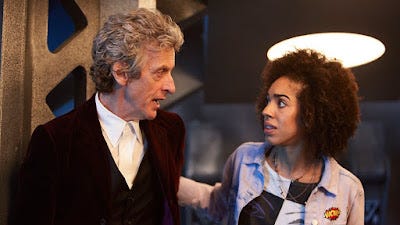
“Well first, you have to imagine a very big box fitting inside a very small box.”
“Okay.”
“Then, you have to make one. It’s the second part people normally get stuck on.”
An episode I very much liked when it aired, but absolutely loved upon revisiting it for this piece, “The Pilot” treats us to one of the best companion introductions in the history of Doctor Who, as we are reintroduced to the Doctor’s world through the eyes of Bill Potts, played wonderfully by Pearl Mackie. I’m not sure a companion has ever been so thoroughly defined after just one episode, but by the end of the hour, Bill already feels like a close friend, and that’s no small feat. I love the structure of this story, the way it lets so much time pass between when Bill first meets the Doctor and when their first adventure begins in earnest. She and the Doctor have a well-defined teacher/student relationship long before a mysterious puddle sends her on an adventure in the TARDIS, and that sense of mundanity – of Bill and the Doctor meeting first as people, not out of magnificent circumstance – adds a lot to the narrative. The water-logged Heather makes for a suitably creepy enemy, much like a monster in a Japanese horror film, but I especially like how it all ties back to Bill’s day-to-day life, to this little crush she had that winds up leading her on this grand adventure.
And scene after scene, the entire episode is a testament to how confident and capable the entire Doctor Who team was at this point, from Moffat’s outstanding writing – the construction of the episode’s long, dialogue-driven first scene in the Doctor’s office is simply masterful – to Lawrence Gough’s excellent direction – the long pull-back on Bill’s first entry into the TARDIS, from total darkness to all the lights bursting on, is jaw-dropping – to Capaldi’s continuingly evolving performance, which gets to add so many lovely little grace notes opposite a new companion. “The Pilot” is that rare kind of episode that manages to establish a new status quo and tell a very good story all in one go, kicking off Moffat and Capaldi’s final run with a real bang.
21. Into the Dalek
(written with Phil Ford)
Twelfth Doctor, Series 8; Directed by Ben Wheatley

“Clara, be my pal, and tell me…am I a good man?”
Here is another episode I underestimated when it aired, thinking it good but not great, only to find one of the very best Doctor Who Dalek stories (especially for the modern era) upon rewatching it for this article. It’s a story that pulls one in with one very intriguing, well-executed premise – the Doctor and Clara must shrink themselves down and travel inside a Dalek to see if it can be repaired – only to gradually reveal a second, even more thoughtful and revelatory notion: What if there was actually a good Dalek, a Dalek who could see and understand the wonders of the universe? What would that mean to the Doctor? How would he react? And how far would he go to see if it was real? And that’s exactly what we get here, in an episode that plumbs both halves of its premise for all they are worth, and in the process goes a great distance towards helping reveal the character of the Twelfth Doctor. He is a much darker, more severe character in the early going than I had remembered – in this episode especially, he has no bedside manner whatsoever – but with a spark of existential curiosity that drives so many of these early stories.
This one makes especially good use of his inner turmoil, whether in the iconic scene quotes above that essentially lays out the thesis for Series 8, or in the later scenes where he tries so hard to connect to this malfunctioning Dalek that may have experienced a profound moral awakening. The climax, in which the Doctor invites the Dalek to see into his own soul, is simply stunning, and the resolution – that in the Doctor’s soul, the Dalek sees only hatred – feels genuinely tragic and painful. Like Robert Shearman’s “Dalek” did for Christopher Eccleston’s Ninth Doctor, “Into the Dalek” uses the Doctor’s greatest foe to reveal something profoundly particular about this new incarnation, and it does so with aplomb.
Come back tomorrow for Part 3, with #20 - #11, as we continue our journey through all 40 Steven Moffat Doctor Who stories!
Follow author Jonathan Lack on Twitter.

